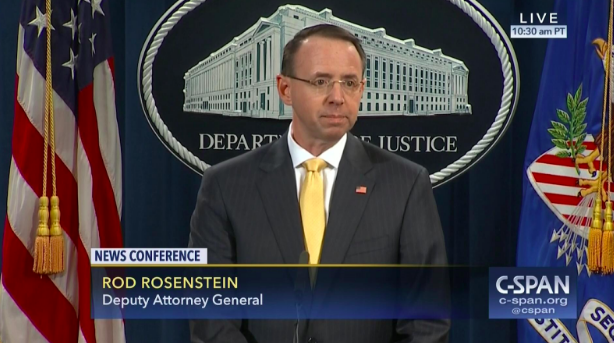Mueller Indicts 12 Russian Agents in Special Counsel Investigation
On Friday, July 13, Deputy Attorney General Rod Rosenstein announced the indictment of 12 Russian military intelligence officers issued by Robert Mueller’s Special Counsel. The Special Counsel, which is actively investigating Russian interference in the 2016 election, issued the indictment on the grounds that the 12 military officers conspired to hack the Democratic National Committee (DNC), Democratic Congressional Campaign Committee (DCCC), and the campaign of Presidential candidate Hillary Clinton in an effort to bolster President Donald Trump’s chances of winning the election.
The indictment, which is composed of 29 pages of accusations against the Russian government, reveals more about the extent to which the 2016 election was influenced than any other official documents released by the investigation to date. The indictment details the aggressive and elaborate effort of Russia’s top intelligence agency, called the Main Intelligence Directorate of the General Staff, to hack the email accounts of the DNC, DCCC, and Clinton campaign, and subsequently release those stolen emails and documents via false online personas and persons associated with WikiLeaks. The indictment, as has been asserted in various other reports from top US intelligence agencies, concludes that these cyber-operations were conducted in an attempt to sabotage the Clinton Campaign.
The indictment details the complex schemes and tactics employed by Russian officials in an effort to deny victory to President Trump’s Democratic Rival, Hillary Clinton, which ranged from phishing scams to gain access to emails of Democratic operatives, to attempting to gain access to state election hardware, and even to money laundering operations via Bitcoin to finance the operation.
Despite the Special Counsel’s accusation of Russian interference, and the near-unanimous views held by American intelligence and law enforcement agencies, the Russian government has maintained that it had nothing to do with any of the attacks on the American democratic process. President Trump has also famously been at odds with the agencies he leads, casting doubt on the prospect that Russia was behind the 2016 election meddling (asserting in September of 2016 that “It also could be somebody sitting on their bed that weighs 400 pounds,”) and resorting to Twitter to deem the investigation a mere “witch hunt”.
The timing of the Special Counsel’s indictment, which comes days before the Helsinki Summit–an event that will see President Trump meet in private with Russian President Vladimir Putin, adds an element of conspiracy to the politically-charged atmosphere. President Trump and his allies are likely to seize the timing as an opportunity to perpetrate conspiratorial views that Robert Mueller and his prosecutors are set on undermining the President’s effort at detente with Russia–something that Mr. Trump has long claimed he, and only he, is capable of.
In addition to detailing Russian operatives’ tactics to influence the 2016 election, the indictment revealed that on July 27, 2016, Russian hackers tried, for the first time, to break into the servers of candidate Hillary Clinton’s personal offices. July 27 was also the day that then-candidate Trump publicly encouraged Russia to “find [her] 30,000 emails that are missing,” during a press conference. The indictment does not mention these remarks, however, as it would constitute speculation.
The indictment builds on several revelations made in the past year, including a declassified 2017 report by US intel that determined that President Vladimir Putin had ordered an operation to help President Trump’s election chances through various processes that would discredit candidate Hillary Clinton and contrast her unfavorably to him. One of the most notorious processes of this operation being the proliferation of targeted “fake news” on social media services such as Facebook.
The indictment, like various other official reports by US intel, does not conclude whether the Russian government’s election meddling had a significant impact on the outcome of the 2016 election.












































